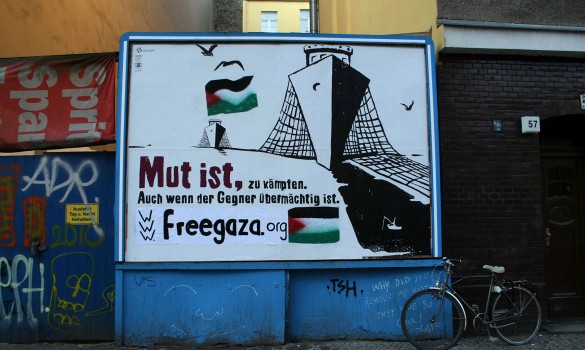
In the coming week, activists from across the world are taking part in a collective action aimed at ending the siege of Gaza. Freedom Flotilla II (dubbed the “Stay Human” flotilla in memory of Italian activist Vittorio Arrigoni) is expected to bring together ships from 10 different countries, carrying passengers from across the spectrum of global civil society as well as the political and media spheres, with two of the boats also carrying a cargo of humanitarian aid. In the words of a recent press release by the International Coalition of Freedom Flotilla II:
“Israel’s policy of collective punishment remains intact. There is no doubt about the need for the flotilla. The so-called “established channels” for delivering aid to Gaza, referred to by global leaders seeking to stop our mission, do not allow for the needs of the people of Gaza to be met due to Israel’s many restrictions, nor do they permit freedom for Palestinians.
“Nowhere else in the world are people required by the international community to accept humanitarian aid instead of freedom. And even that humanitarian aid is not forthcoming, owing to Israel’s blockade.”(1)
As such, the aims of the flotilla extend well beyond delivering the symbolic cargo that it carries. It is a grassroots action linking ‘spatial intervention’ (direct action) with the transformative potential of a global advocacy network, with the aim of dismantling the entire military and diplomatic framework of control that has strangled the people and economy of Gaza for nearly half a decade. By directly challenging the sea blockade (despite the repeated threats of violence by the Israeli government),(2) the flotilla not only has the potential to breach the siege physically, but also to create a window of possibility within which this global activist community can take action.


Regardless if the flotilla is able to reach the shores of Gaza, or Israeli forces intercept it, the mere planning of the action is already eliciting a response from both Israel and the international establishment. It is this audacity to challenge such power structures that makes the action such a bold and effectual one, with the possibility to transform the political landscape of complicity and indifference that has allowed the siege to persist. In a recent article Noam Chomsky, Huwaida Arraf and Gabriel Schivone underlined the need for grassroots actions to lead political processes, and intimated the historic precedents for the flotilla:
“International law looks good on paper, but its enforcement requires political will. As the Civil Rights and other social change movements in the United States and elsewhere have shown, citizen action is an important part of creating political will, limited only by the choice to act. People acting together in the name of freedom, human rights, and democracy, can constitute a powerful force that even the most oppressive regimes cannot withstand.
“The success of the next flotilla — and all those to follow — will largely depend on the will and choice of the international community to resist U.S.-backed Israeli crimes in the occupied territories and on the sea — and to stand with Palestinians until the death and the suffering ends and a lasting and honorable peace is achieved.”(3)
Notably, the international outcry that followed Israel’s killing of nine people on board the Mavi Marmara last year led to a series of statements by the Israeli government and Hosni Mubarak’s former regime in Egypt towards loosening the siege. Although their pronouncements turned out to be little more than empty rhetoric,(4) and the idea of a ‘liberal’ or ‘humanitarian’ siege is in any case a contradiction in terms, such machinations demonstrate a decisive shift towards an atmosphere of accountability. Yet, such machinations demonstrate a decisive shift towards an atmosphere of accountability. And, with the political transformation taking place in Egypt, this atmosphere will almost certainly extend directly to the gates of the Rafah crossing. It is here that the interim Egyptian military authority has for months promised to end restrictions on Palestinian movement and trade, yet until now with little tangible benefit to the people of Gaza.(5)
Crucially, ‘Freedom Flotilla II’ should not be understood only as a few hundred people on a handful of boats in the Mediterranean. It should be seen as a vehicle to highlight the illegality and absurdity of the siege on Gaza, and as a point of focus in a global action. The reality is that it is the ceaseless advocacy and solidarity work of many thousands of activists around the world, not least the Palestinians in Gaza themselves, that will overturn the blockade. And, beyond this, the possibilities for the future are limited only by our collective energy and imagination.
(Note: If you would like to engage in the collective efforts surrounding the flotilla, the organisers of the US Boat to Gaza have suggested possible actions. In addition, the organising coalition and each of the national/regional organising groups will be issuing updates and related action alerts: Belgium, Canada, Denmark, France, Greece, Italy, Malaysia, Netherlands, Norway, Scotland, Spain, Sweden, Turkey, UK, USA)
End Notes:
1. International Coalition of Freedom Flotilla II, Press Release from Istanbul
2. Saleh Naami (Ahram Online), Israel to block second flotilla ‘at all costs’
3. Huwaida Arraf, Noam Chomsky and Gabriel Schivone, Breaking the Gaza embargo and Israeli piracy
4. Joint Agency Report, Dashed Hopes: Continuation of the Gaza blockade
5. Gaza Gateway (Gisha), The top 10 reasons why the opening of Rafah Crossing just doesn’t cut it
